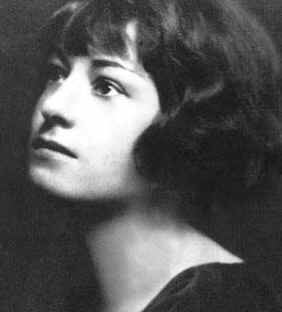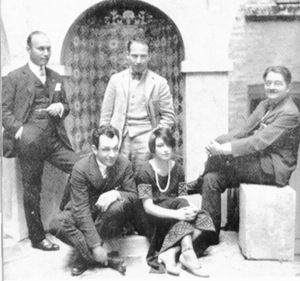Dorothy Parker facts for kids
Quick facts for kids
Dorothy Parker
|
|
|---|---|

Parker, c. 1910s-1920s
|
|
| Born | Dorothy Rothschild August 22, 1893 Long Branch, New Jersey, U.S. |
| Died | June 7, 1967 (aged 73) Manhattan, New York City, U.S. |
| Resting place | Woodlawn Cemetery |
| Occupation |
|
| Nationality | American |
| Genre | Poetry, satire, short stories, criticism, essays |
| Literary movement | American modernism |
| Notable works | Enough Rope, Sunset Gun, A Star Is Born |
| Notable awards | O. Henry Award 1929 |
| Spouses |
Edwin Pond Parker II
(m. 1917; div. 1928)Alan Campbell
(m. 1934; div. 1947)
(m. 1950; died 1963) |
Dorothy Parker (born Dorothy Rothschild; August 22, 1893 – June 7, 1967) was a famous American writer. She was a poet, author, and critic known for her sharp wit and funny observations about life in New York City in the 1900s.
Dorothy had a difficult childhood. But she became very successful, publishing her writings in popular magazines like The New Yorker. She was also a founding member of a famous group of writers and artists called the Algonquin Round Table. After this group broke up, Dorothy moved to Hollywood. There, she became a screenwriter, writing scripts for movies. She was even nominated for two Academy Awards. However, her support for left-wing politics led to her being put on the Hollywood blacklist. This meant she couldn't work in Hollywood for a while.
Dorothy often downplayed her own talents. She didn't like being known just for her "wisecracks." But her writings and her reputation for being clever are still remembered today. Some of her poems have even been turned into songs and operas.
Contents
Early Life and First Steps in Writing
Dorothy Parker was born Dorothy Rothschild in 1893 in Long Branch, New Jersey. Her parents, Jacob Henry Rothschild and Eliza Annie, had a summer home there. Her mother was from Scotland, and her father's family were Jewish immigrants from Prussia. Dorothy's mother died when Dorothy was almost five years old.
Her father remarried in 1900 to Eleanor Frances Lewis. Dorothy didn't get along with her stepmother. She called her "the housekeeper" instead of "mother." Dorothy grew up in Manhattan and went to a Catholic school. She once joked that she was asked to leave school after making a funny comment about a religious topic. Her stepmother died when Dorothy was nine. Dorothy later attended a finishing school in New Jersey. After her father died in 1913, she played piano at a dancing school to earn money while she worked on her poems.
In 1914, she sold her first poem to Vanity Fair magazine. A few months later, she got a job as an assistant at Vogue magazine. After two years, she moved to Vanity Fair as a writer.
In 1917, she married Edwin Pond Parker II, a Wall Street stockbroker. He went to serve in World War I. Dorothy and Edwin divorced in 1928. Dorothy kept her married name, Parker. She later married another writer, Alan Campbell, and they moved to Hollywood.
The Algonquin Round Table Years

Dorothy Parker's career really took off in 1918. She was writing theater reviews for Vanity Fair. There, she met Robert Benchley and Robert E. Sherwood. They became close friends. The three of them started having lunch almost every day at the Algonquin Hotel in New York City. This group became known as the Algonquin Round Table. Other famous members included newspaper writers Franklin Pierce Adams and Alexander Woollcott.
Through their writings, especially in Adams's column, Dorothy became known across the country for her quick wit. For example, when the group heard that former president Calvin Coolidge had died, Parker famously joked, "How could they tell?"
Dorothy's sharp humor as a critic was very popular at first. But she was fired from Vanity Fair in 1920 because her reviews sometimes offended powerful people. Her friend Robert Benchley resigned to support her. Dorothy soon started writing for other magazines like Ainslee's Magazine, The Smart Set, and The American Mercury. She also wrote for popular magazines like Ladies’ Home Journal and Saturday Evening Post.
When Harold Ross started The New Yorker magazine in 1925, Dorothy Parker and Robert Benchley were part of the first group of editors. Parker's first piece for the magazine was in its second issue. She became famous for her short, funny poems. Many of these poems made fun of her often unsuccessful romantic relationships.
The next 15 years were Dorothy Parker's most successful. In the 1920s alone, she published about 300 poems and free verses. These appeared in Vanity Fair, Vogue, The New Yorker, and other magazines.
In 1926, Parker published her first book of poems, Enough Rope. It sold 47,000 copies and received great reviews. Critics praised her poems for their humor and honesty. Some critics called her work "flapper verse," but the book helped make her famous for her sparkling wit. She released two more poetry books, Sunset Gun (1928) and Death and Taxes (1931). She also published short story collections like Laments for the Living (1930) and After Such Pleasures (1933).
Dorothy also worked with playwright Elmer Rice on a play called Close Harmony. It opened on Broadway in 1924. The play was well-liked but only ran for 24 performances. It later became a successful touring show called The Lady Next Door.
Some of Parker's most popular work was her sharp book reviews for The New Yorker. She wrote them under the name "Constant Reader." Her funny review of A. A. Milne's The House at Pooh Corner became famous. Her reviews were widely read and were later published in a collection called Constant Reader in 1970.
Her best-known short story, "Big Blonde," won the O. Henry Award in 1929. Her short stories were often witty but also serious and a bit sad. Her writing style is often described as sarcastic.
Hollywood Career and Activism
In 1932, Dorothy Parker met Alan Campbell, an actor who wanted to be a screenwriter. They married two years later. They moved to Hollywood and started working for Paramount Pictures. Dorothy earned a lot more money than Alan at first. They eventually earned thousands of dollars a week writing for different studios. They worked on more than 15 films together.
In 1935, Parker wrote lyrics for the song "I Wished on the Moon." Bing Crosby sang it in a movie.
With Alan Campbell and Robert Carson, she wrote the script for the 1937 film A Star Is Born. They were nominated for an Academy Award for Best Screenplay. She also wrote extra dialogue for The Little Foxes in 1941. She received another Oscar nomination for the screenplay of Smash-Up, the Story of a Woman (1947).
During the 1930s and 1940s, Dorothy Parker became very active in supporting civil liberties and civil rights. She often criticized powerful figures. During the Great Depression, she joined many American artists and thinkers who were involved in social movements. In 1937, she reported on the Loyalist cause in Spain for a Communist magazine. She also helped start the Hollywood Anti-Nazi League in 1936. This group grew to have about 4,000 members.
Parker also led the fundraising for the "Spanish Refugee Appeal." She helped organize efforts to transport Spanish war veterans to Mexico. She also supported many other left-wing causes. Her old friends from the Round Table saw less of her. Her friendship with Robert Benchley became difficult, though they later made up.
In 1950, Parker was listed as a Communist in a publication called Red Channels. The FBI created a large file on her because they suspected her of being involved in Communism. This happened during a time when Senator Joseph McCarthy was concerned about communists in the government and Hollywood. As a result, movie studios put her on the Hollywood blacklist. This made it very hard for her to find work. Her last screenplay was The Fan in 1949.
Her marriage to Alan Campbell was often difficult. They divorced in 1947, remarried in 1950, and then separated in 1952. Dorothy moved back to New York. From 1957 to 1962, she lived in a hotel and wrote book reviews for Esquire magazine. She returned to Hollywood in 1961 and worked with Campbell on some projects until he died in 1963.
Later Life and Legacy
After Alan Campbell's death, Dorothy Parker moved back to New York City.
Parker sometimes appeared on radio shows. She wrote for the Columbia Workshop, and other famous people used her writings for their radio monologues.
Dorothy Parker died on June 7, 1967, from a heart attack. She was 73 years old. In her will, she left all her money and property to Martin Luther King Jr.. After King's death, her estate went to the NAACP, a civil rights organization.
Burial
After she was cremated, Dorothy Parker's ashes were not claimed for several years. In 1973, the crematorium sent them to her lawyer's office. The ashes stayed in a filing cabinet for about 17 years. In 1988, this situation became public. The NAACP claimed Parker's ashes and created a memorial garden for them outside their headquarters in Baltimore.
In early 2020, the NAACP moved its headquarters. There was discussion about what would happen to Parker's ashes. The NAACP stated that her ashes would go where her family wanted them to be.
Her relatives asked for the ashes to be moved to the family's plot in Woodlawn Cemetery in the Bronx. Her father had reserved a spot for her there. On August 18, 2020, Parker's urn was moved. She was re-buried privately in Woodlawn on August 22, 2020.
Honors and Recognition
On August 22, 1992, the 99th anniversary of Parker's birth, the United States Postal Service issued a special 29¢ postage stamp in her honor. The Algonquin Hotel, where the Round Table met, was named a New York City Historic Landmark in 1987. In 1996, it was named a National Literary Landmark because of the contributions of Parker and the other Round Table members. A bronze plaque marks the front of the hotel. Parker's birthplace in New Jersey was also named a National Literary Landmark in 2005.
In 2014, Dorothy Parker was chosen to be in the New Jersey Hall of Fame.
Adaptations of Her Work
In the 2010s, some of Dorothy Parker's poems were set to music by composer Marcus Paus. This became an opera song cycle called Hate Songs for Mezzo-Soprano and Orchestra (2014). This work was praised by music critics. It expresses Parker's common theme: how difficult people can be, especially men.
In 2014, a Canadian singer named Myriam Gendron used lyrics from Parker's poetry book Not So Deep as a Well to create a folk album. Also in 2014, Chicago jazz musician Katie Ernst released an album called Little Words. It featured her musical settings of seven of Parker's poems.
In 2021, her book Men I'm Not Married To was turned into an opera. It was created by composer Lisa DeSpain and writer Rachel J. Peters. The opera premiered online in February 2021.
|
See also
 In Spanish: Dorothy Parker para niños
In Spanish: Dorothy Parker para niños
 | Bessie Coleman |
 | Spann Watson |
 | Jill E. Brown |
 | Sherman W. White |


